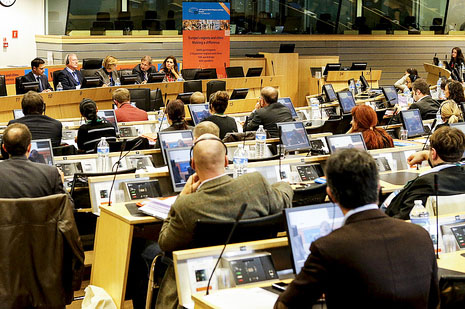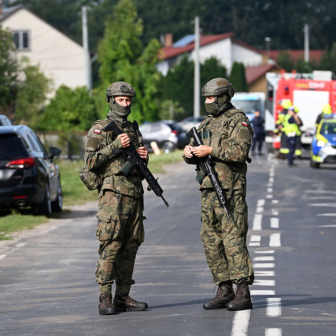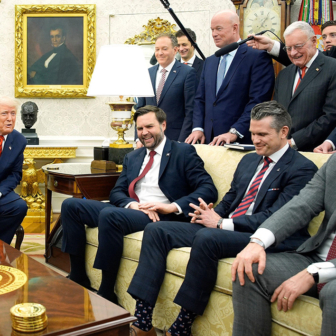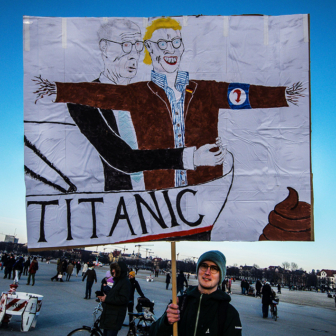MOBILE phones are powered down, laptops snap shut and social media updates suddenly cease. For the first time today, the fifteen-or-so journalists crowded into a small room of the plush Residential Palace are all ears.
The speaker is a softly spoken Flemish journalist who has volunteered to explain to his newly arrived colleagues how they will fare under local tax laws. And the news isn’t good. Those of us classified as local residents should expect to get clobbered: high tax rates, hard-to-claim deductions and a mountain of paperwork in a choice of two languages, neither of them English.
“How could this be?” interjects a Macedonian journalist. “I have a wife and a daughter to support, and if I pay…”
The speaker tries to stop him. “I’m not a tax lawyer or an accountant,” he says. “Just let me get through my presentation – I can’t comment on specific cases…”
“Okay,” said the Macedonian journalist. “Nothing specific. Let’s assume there is a reporter from a former Yugoslav republic living here with a partner and, say, one child. How can he be expected…”
And so on for the next hour. After a day of very useful presentations about the European Union, many of the participants of this EU-sponsored induction course for foreign journalists are realising that the one institution they need to get to know better is, in fact, the Belgian federal tax office.
The class of 2012 here at what is possibly the largest press gallery in the world would be unrecognisable to those doing the job just ten years ago. This multicultural workforce may look and sound the same, but it has been comprehensively casualised. With fewer journalists who can describe themselves as for a specific media outlet – and are paid and taxed in their home country – the number of people who freelance for a range of publications has grown significantly. Often that means that they pay taxes locally and have to meet their own travel expenses.
Over coffee during a break I chat with a radio and TV journalist from eastern Europe. He has been here for six months and files several times a day for his country’s national broadcaster. But he tells me that the person he replaced had been a fully-fledged correspondent who was, apparently, costing his network too much. So, as the reporter told me with a grin, he was sent over here to be employed as a local freelancer on a temporary contract. “I am cheap – very cheap,” he says.
There are ways for freelancers to avoid paying taxes in Belgium, but none of them is particularly effective. Some casual journalists working out of the European Union are taxed in their home countries but only manage to keep that arrangement in place by flying under the radar of Belgian authorities. They don’t apply for residency and aren’t part of the Belgian health system. (One journalist tells me he’s about to fly home to have his wisdom teeth out.) Yet the take-home message from today’s briefing is that Brussels will get you eventually – “Brussels” in this case being the capital of the Kingdom of Belgium.
EVERY day for the past couple of months I have been parking my computer in the press area of the European Commission – literally a few steps away from the large press conference room. I’m surrounded by a multinational (and multilingual) army of casual reporters, taking advantage of the free wifi and what appears to be subsidised coffee (€0.90 a cup – how is that possible?). While the capital-C working for the big mastheads are around the corner at the International Press Centre or the Residential Palace, us freelancers are squeezing into the nooks and crannies of a crowded media landscape.
Being the only Australian around and having no obvious affinity with the other anglophones, I have been adopted by a group of Italians, who promptly informed me that my human rights were being violated every time I ate at the Commission’s canteen (the European Council across the road is much better). They’re an interesting bunch of people: smart, articulate, speaking good English and mainly in their early thirties. One of them has carved out a niche by filing for a small wire service and an aviation magazine; another has been employed locally by the Brussels bureau of an Italian cable news TV station; another files for an agricultural newsletter. They are all going from contract to contract, sometimes even from job to job, and they’re always on the lookout for more.
I’m also introduced to the “father” of the Italian press corps: a distinguished gentleman whose business card reads like a tautology: collaboratore fisso (“permanent stringer”). His newspaper in Italy didn’t want to pay for him to stay in Brussels, but instead agreed to buy a certain number of his stories every week and put him on a type of retainer. And he’s not alone: Italy’s second-largest newspaper, La Repubblica, recently replaced its retiring Brussels correspondent with… himself – that is, they told him he could stay in the position, but as a casual with an exclusive contract. The paper’s Brussels bureau is now made up of a retired correspondent supplementing his superannuation by doing the same job he was doing before.
It’s not the glamorous life you would associate with journalism in the most important city of Europe. Over the course of a day I overhear one journalist on the phone demanding to know what kind of lunch would be served (free of charge) at a conference he was thinking of covering. “When you say sandwiches – what kind of sandwiches?” he asks. A bit later someone is locked in a tug-of-war with his newspaper, which wants him to attend an annual meeting in his home country but won’t pay the airfare. The head office eventually relents, but the journalist will have to take a Ryan Air flight out of Charleroi (the town, an hour’s drive south of Brussels, that everyone loves to hate). The journalist grumbles about it for the rest of the day.
How this casualisation is affecting the reporting of European news is hard to say, given that many European freelancers sitting alongside me as I write this have never known anything else. They work frantically – rushing from the midday press conference then typing madly for the next hour. They rarely travel and will readily admit that they don’t have much time for research – they are there to gather the hassle-free news which the European Union offers them every day.
AND if straightforward news is your game, work here at the European Union can be easy. Every day the pigeonholes outside the European Commission’s press conference room fill up with media releases announcing important and expensive policy decisions. More often than not you’ll get the mobile phone numbers of highly articulate (and multilingual) advisers to offer background or on-the-record quotes. You can attend “technical briefings” and, if you play your cards right, you can secure an interview with a commissioner.
For the electronic media there are two online channels covering all EU events (in Luxembourg, Brussels and Strasbourg) and more video-on-demand than you could poke a memory stick at. Studios and technicians are made available, free of charge: if you want to record a TV interview with a member of the European Parliament, just call the guys down in audiovisual bookings.
When I told a journalist friend that I was moving to Brussels, he told me I had it made. “Just show up and pick the low-hanging fruit,” he said. And he was right – there’s no shortage of stuff to do. But who wants to buy this produce? On which market can you sell it? And, more importantly, what does it all mean?
With policy announcements worth millions of euros made on an almost daily basis, under-resourced journalists can struggle to work out what to cover and why. The press gallery is full of people running around with press releases, desperately looking for an angle.
One day I picked up all the pieces of official communication I could find: fifteen items. An announcement by the commissioner for regional policy on competition and state aid; a European parliamentary committee looking into the Common European Sales Law; an announcement by vice-president Catherine Ashton about the elections in Ukraine; the Commission approving the merger of two telecommunications companies… Meanwhile, my email inbox was filling up with email alerts from EU bodies I hadn’t known existed.
The centrepiece of the European Union’s news-generating system is the Commission’s daily, midday press conference, which can usually be relied on to provide no new information. In fact, more often than not the Commission’s spokeswoman Pia Ahrenkilde Hansen (a multilingual version of C.J., for fans of The West Wing) simply reiterates what has been announced in the media releases. I begin to suspect that reporters are showing up simply to find a way into a story – to get a sense from the questions of other journalists of where they might find a hook.
After Commission president José Manuel Barroso left the press conference room following the announcement that the European Union had won the Nobel Peace Prize, for example, Ahrenkilde Hansen took some questions. One journalist asked which part of the European Union would receive the prize money; another wondered who would be accepting the prize on behalf of the European Union. Both questions were politely dismissed, but the angle was emerging. The stories “EU wins Nobel” could be beefed up with a few pars pointing to simmering institutional tension over the award.
It’s only the English tabloids that have what many journalists here would die for – an angle. After the Nobel Prize was announced, a grumpy British journalist stormed into the press centre saying how much he hates the EU. There were gasps of horror from his continental colleagues, who are overwhelmingly supportive of the European project (they applauded Barroso after his Nobel announcement – even though he refused to take any of their questions). But for the English tabloids the European Union is made up of sleazy continental types stealing money from the British taxpayer; all the journalist needs to do is calculate how much each over-the-top program is costing Britain and the article writes itself. It’s driven by xenophobia, sure – but in a media landscape in which reporters may have neither the time nor the inclination to scrutinise policy, it’s also the strongest journalism around.
MY FELLOW inductees joke that they have already learnt the most important rule for a journalist working out of Brussels: spend the last ten minutes of your day deleting emails you have received from the European Union. You don’t want to take that stuff home with you and a cathartic ritual can be empowering. But on the broader issue of how to manage our relationship with the institution we’ll be covering, we are offered no advice.
We’re here right at a turning point in the history of Europe – and the world. Over coming years the European Union will either start to unravel or its core members will embrace the pioneering spirit of the grouping’s founders and drive for greater unity – even a fully fledged federation. It’s all happening at a snail’s pace, but when our reports over the next five years are summed up, we will have chronicled something huge. It could be the best work of our careers.
But will we be up to the challenge? Will we manage to rise above the daily fog of press releases, quotable quotes and petty bickering to make sense of the times we are living in? Or does our vantage point in the basement of the Commission make us too close to the action – too compromised by the mechanics of policy announcements – to ever make sense of what’s going on?
At the end of the induction course an enterprising Brazilian journalist gathers everyone’s email address and promises to organise drinks so that we can stay in touch. We shake hands and wish each other well. But as we make our way to the Commission’s main entrance, with the twenty-seven European flags flying in the cold wind, I can’t help but wonder if the hard-working class of 2012 will ever seize its chance to soar. •




